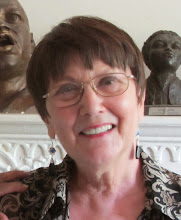Their Love for Literature
Jack and May Musicant had a love for literature, and I'm grateful that they encouraged this love in me. Their appreciation for the world literature was broadened, strengthened, and encouraged in the hundreds of Aesthetic Realism lectures given by Eli Siegel, which they attended for many years. I remember my mother coming home after hearing Mr. Siegel speak about Lewis Carroll's Alice in Wonderland, and reading it aloud to her children and our friends. My father read us Walt Whitman's poems, and some of his journal entries as a nurse during the Civil War. There were humorous books, like Life among the Savages, by Shirley Jackson--the "savages" being her children and the predicaments they got themselves into. And, of course, there were novels, like Thackeray's Vanity Fair, and Sir Walter Scott's Ivanhoe and The Pirate; the plays of Shakespeare, Eugene O'Neill, and short stories and histories--the wealth of knowledge the world provides.
At a recent Writers' Conference in Connecticut, I had the privilege of speaking about how I came to love writing, reading, and research based on my Aesthetic Realism education. That education began in classes I was privileged to attend, taught by Eli Siegel, and classes taught today by Ellen Reiss, the Class Chairman of Aesthetic Realism. It gave me great pleasure to speak at this conference about the influence of my parents in my passion for literature, which is so much a part of my life and thought.
Here are some links to literary criticism by Ellen Reiss and others, which I see as thrilling, and having the exactitude that makes for the deepest pleasure and respect.
Ellen Reiss writes on poet Robert Burns: "I comment on two poems of Robert Burns that are a means of asking, How should jobs and work be in this land?"
Ellen Reiss comments on eight poems by Eli Siegel. The poems are titled "The Persistence of Fabric." She writes: "They are beautiful. They have the factual immediacy of cloth one can touch—and also the mystery that can be in the feelings of people: the emotions that whirl within us, or rustle in us, even as we put on a well-fitting garment."
Aesthetic Realism Can End Racism / Writing by Ellen Reiss and others. Educator Christopher Balchin Includes links to not-to-be-missed articles and websites countering racism.
Class Conducted by Ellen Reiss. "How Should a Child Be Seen?" A Report by Barbara McClung and Lauren Phillips, elementary school teachers
Ellen Reiss on J.K. Rowling, Harry Potter, & Romanticism. Commenting on Eli Siegel's lecture Aesthetic Realism and Nature Ellen Reiss tells of these opposites: the ordinariness and strangeness of reality.Ellen Reiss on "criticizing" John Keats in 1818. In her important commentary on Eli Siegel's lecture "Poetry and Keenness," Ellen Reiss describes the motive behind a notorious attack on the great poet John Keats, illuminating an anger in our time as ugly as the anger at Keats in his time.
At a recent Writers' Conference in Connecticut, I had the privilege of speaking about how I came to love writing, reading, and research based on my Aesthetic Realism education. That education began in classes I was privileged to attend, taught by Eli Siegel, and classes taught today by Ellen Reiss, the Class Chairman of Aesthetic Realism. It gave me great pleasure to speak at this conference about the influence of my parents in my passion for literature, which is so much a part of my life and thought.
Here are some links to literary criticism by Ellen Reiss and others, which I see as thrilling, and having the exactitude that makes for the deepest pleasure and respect.
Ellen Reiss writes on poet Robert Burns: "I comment on two poems of Robert Burns that are a means of asking, How should jobs and work be in this land?"
Ellen Reiss comments on eight poems by Eli Siegel. The poems are titled "The Persistence of Fabric." She writes: "They are beautiful. They have the factual immediacy of cloth one can touch—and also the mystery that can be in the feelings of people: the emotions that whirl within us, or rustle in us, even as we put on a well-fitting garment."
Aesthetic Realism Can End Racism / Writing by Ellen Reiss and others. Educator Christopher Balchin Includes links to not-to-be-missed articles and websites countering racism.
Class Conducted by Ellen Reiss. "How Should a Child Be Seen?" A Report by Barbara McClung and Lauren Phillips, elementary school teachers
Ellen Reiss on J.K. Rowling, Harry Potter, & Romanticism. Commenting on Eli Siegel's lecture Aesthetic Realism and Nature Ellen Reiss tells of these opposites: the ordinariness and strangeness of reality.Ellen Reiss on "criticizing" John Keats in 1818. In her important commentary on Eli Siegel's lecture "Poetry and Keenness," Ellen Reiss describes the motive behind a notorious attack on the great poet John Keats, illuminating an anger in our time as ugly as the anger at Keats in his time.



<< Home